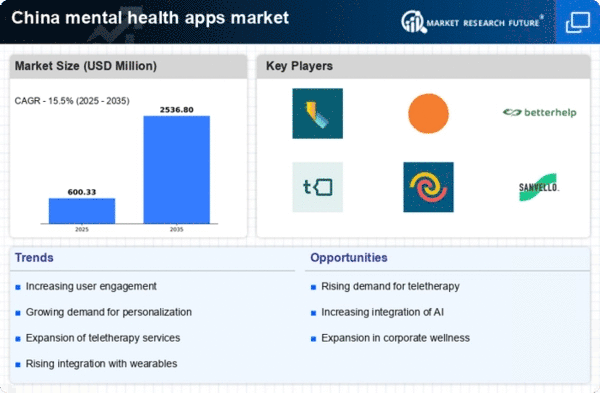Rising Mental Health Awareness
The increasing awareness of mental health issues in China is a pivotal driver for the mental health-apps market. As societal stigma diminishes, more individuals are seeking help for mental health concerns. Reports indicate that approximately 16% of the Chinese population experiences mental health disorders, yet only a fraction receives treatment. This gap presents a significant opportunity for mental health-apps to provide accessible support. The mental health-apps market is likely to benefit from this growing recognition, as users turn to technology for solutions. Furthermore, educational campaigns and government initiatives aimed at promoting mental well-being are expected to enhance user engagement with these applications, thereby expanding the market's reach and potential revenue streams.
Government Support and Regulation
Government initiatives aimed at improving mental health services are significantly influencing the mental health-apps market. In recent years, the Chinese government has implemented policies to enhance mental health care accessibility and quality. For instance, the National Mental Health Work Plan emphasizes the importance of integrating digital solutions into traditional healthcare systems. This regulatory support not only legitimizes mental health-apps but also encourages investment in the sector. As a result, the mental health-apps market is likely to see increased funding and development opportunities, fostering innovation and improving service delivery. The collaboration between public health authorities and app developers may lead to more effective solutions tailored to the needs of the population.
Increased Focus on Youth Mental Health
The mental health of youth in China is becoming a focal point for both parents and educators, driving demand for mental health-apps tailored to younger demographics. With rising academic pressures and social challenges, mental health issues among adolescents are increasingly recognized. The mental health-apps market is responding by developing age-appropriate content and features that resonate with younger users. Reports indicate that nearly 25% of Chinese youth experience mental health challenges, highlighting a critical need for accessible resources. As schools and parents seek effective tools to support mental well-being, the market for youth-oriented mental health applications is likely to expand, fostering a generation more attuned to mental health needs.
Growing Demand for Remote Mental Health Services
The demand for remote mental health services is surging in China, driven by the need for accessible and convenient care. Many individuals prefer the anonymity and flexibility that mental health-apps offer, particularly in urban areas where traditional therapy may be less accessible. The mental health-apps market is responding to this trend by providing a range of services, from self-help tools to virtual therapy sessions. Data suggests that the market for teletherapy is expected to grow by over 30% annually, indicating a robust appetite for digital mental health solutions. This shift towards remote services is likely to reshape the landscape of mental health care in China, making it more inclusive and user-friendly.
Technological Advancements in Mobile Applications
Technological innovations play a crucial role in shaping the mental health-apps market. The rapid development of mobile technology, including artificial intelligence and machine learning, enables the creation of more sophisticated applications. These advancements allow for personalized user experiences, which are essential in addressing individual mental health needs. In China, the smartphone penetration rate is over 60%, providing a vast user base for mental health applications. As developers leverage these technologies, the mental health-apps market is poised for growth, with enhanced functionalities such as real-time mood tracking and virtual therapy sessions. This trend suggests that the integration of advanced technology will likely attract more users, further driving market expansion.
















